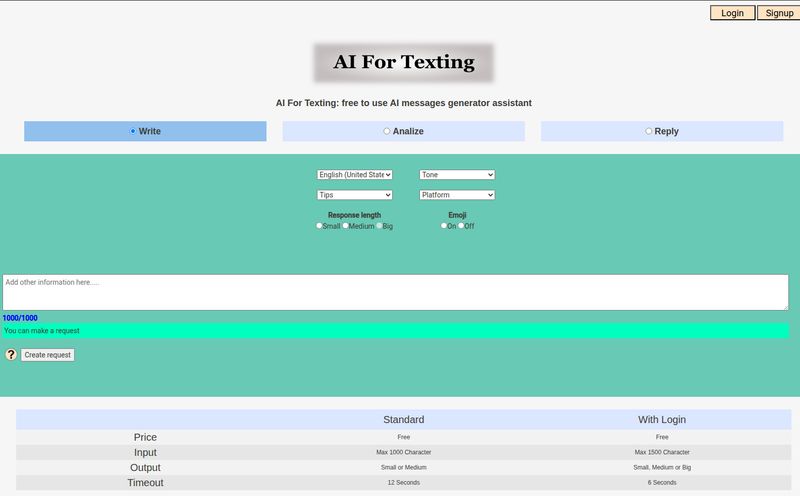We’ve all been there. Staring at the blinking cursor on a blank page, the perfect words feel like they're just on the tip of your tongue, but you can't quite grasp them. It’s the universal writer's curse. For years, the only solution was to get up, walk around, maybe make another cup of coffee and just hope inspiration would strike. Now, we've got AI.
But hold on. I'm not talking about the scary, "a robot is coming for my job" kind of AI. I’m talking about a collaborator. A creative partner that helps you sound more like... you. And that’s where Wordtune enters the chat. I've been in the SEO and content creation game for a long time, and I’ve seen countless tools come and go. I’m naturally skeptical of anything that promises to magically "fix" writing. So, I took Wordtune for a serious spin to see if it actually lives up to the hype. Let’s get into the real talk.
So What Exactly Is Wordtune?
Okay, first things first. Let's clear up a common misconception. Wordtune is not one of those tools where you type "write me a blog post about dog grooming" and it spits out 1,000 words. Think of it less as a ghostwriter and more as a brilliant editor sitting on your shoulder, whispering suggestions in your ear. It’s an AI-powered rephrasing tool at its core.
You write a sentence, a paragraph, whatever—and Wordtune gives you a bunch of different ways to say the same thing. Better, clearer, or more compelling ways. It's built to refine, not just to generate from scratch. And with a user base of over 10 million people, they're clearly doing something right. It's like having a thesaurus that actually understands context and nuance, which is something I've been wanting for years.
The Features That Actually Matter to a Writer
A long list of features can be overwhelming and often feels like marketing fluff. So let's cut through the noise and talk about the tools I actually found myself using day-in and day-out in my own workflow.
More Than Just a Rephraser
The heart of Wordtune is its Rewrite function. This is its bread and butter. You highlight a sentence that feels a bit... meh. You know the one. It's clunky or awkward. Wordtune instantly pops up with a list of alternatives. Some are more formal, some more casual, and some are just plain better constructed. It’s a fantastic way to break out of your own stale writing patterns.
Then you have the Tone adjuster. This is gold. Let's say you've written a sentence for a friendly blog post, but you need to share a snippet on LinkedIn. With one click, you can flip the script from a 'Casual' tone to a 'Formal' one. It’s incredibly handy for adapting your content across different platforms without doing a full, manual rewrite.
The Shorten and Expand features are also surprisingly useful. I’ve used 'Shorten' countless times to get a point to fit into a tweet or a punchy meta description. And 'Expand'? It's great when you've written a sentence that feels a little thin and you want to add some meat to its bones without just adding filler words.

Visit Wordtune
The 'Spices' in the Wordtune Kitchen
Beyond those core functions, there are a few other tools that add some serious flavor to the mix. The Summarizer is a big one. You can feed it a long article or a dense research paper, and it pulls out the key points for you. As an SEO professional who has to read a lot of competitor content and industry studies, this is a massive time-saver.
It also has an AI Writer feature, which is its nod to the generative AI world. You can give it a prompt, and it will help you continue your thought or get a new paragraph started. It’s a nice feature to have for those moments you're truly stuck and need to beat the blank page syndrome.
And one of their newer features, Humanize AI, is really telling of the times. We're all getting a bit tired of that sterile, obviously robotic AI text, right? This feature aims to add a more natural, human-sounding touch to text that might have been generated elsewhere. A very smart move on their part. I think we're seeing a broader shift from pure AI generation to AI refinement, and Wordtune is right at the forefront of that movement.
Where Can You Actually Use This Thing?
This, for me, is one of the biggest wins for Wordtune. It’s not a standalone website you have to keep open in a separate tab. It's primarily a browser extension (for Chrome, Edge, etc.) and it integrates everywhere. I’m talking Google Docs, Gmail, WordPress, Twitter, LinkedIn, Facebook... pretty much any text box you find on the web becomes a Wordtune-enabled field. This is how modern tools should be built. It meets you where you are, rather than forcing you to completely change your workflow. It's so much more fluid than the constant copy-paste-tweak-copy-paste-back cycle you get with other platforms.
Let's Talk Money: A Breakdown of Wordtune's Pricing
Alright, the all-important question. What’s this going to cost you? The good news is, you can get started for free. The pricing structure is pretty straightforward and, in my opinion, very reasonable.
The Free 'Basic' Plan
This is your entry point. You get 10 rewrites per day and basic spelling and grammar checks. It’s completely free, no strings attached. This is a perfect way to get a feel for the tool and see if it clicks with you. For a student who just needs to punch up a few sentences in an essay, or someone who only writes a few important emails a week, this might be all you ever need. It’s a very generous test drive.
The 'Advanced' and 'Unlimited' Plans
If you're a serious writer, let's be honest: you'll burn through those 10 daily rewrites before your first coffee is even finished. That's where the premium plans come in.
- The Advanced plan is $6.99 per month. This unlocks the powerful Tone changer, Shorten & Expand features, the Summarizer, and more. Your usage is still limited daily, but it's a significant step up. It’s a solid middle ground for those who write consistently but not voluminously.
- The Unlimited plan is $9.99 per month, and it’s exactly what it sounds like. All the features, unlimited use, plus premium support. In my professional opinion, for anyone who creates content for a living—bloggers, marketers, social media managers, copywriters—this is the one. The price of two fancy lattes for a month of unlimited creative support is a pretty easy decision to make.
Here's a quick look at how they stack up:
| Feature | Basic ($0) | Advanced ($6.99/mo) | Unlimited ($9.99/mo) |
|---|---|---|---|
| Rewrites | 10 per day | Limited | Unlimited |
| Spelling & Grammar | Yes | Yes | Yes |
| Tone Adjustments | No | Limited | Unlimited |
| Summarizer | No | Limited | Unlimited |
| Premium Support | No | No | Yes |
My Real-World Experience: The Good, The Bad, and The 'Huh?'
So after weeks of using this thing in my actual, messy, deadline-driven workflow, what’s the final word?
The Good: It genuinely makes my writing better and my process faster. It’s not about laziness; it’s about efficiency. When I have a good idea but a clunky sentence, Wordtune is like that brainstorming partner that instantly throws out alternatives without judgment. It has saved me from so much procrastination. The confidence it gives you, especially when you're writing an important client email or a high-stakes piece of ad copy, is worth the price of admission alone.
The Not-So-Good: Let’s be real, it’s not a magic wand. The 10-rewrite limit on teh free plan is frustratingly low for any real volume of work. And not every suggestion it makes is a home run. Sometimes the AI spits out something that’s grammatically correct but just… weird. It misses the human nuance or the specific intent. This isn’t a flaw, really, so much as a reminder that you, the human, are still the pilot. You have to steer the ship and choose the best course. Don't just blindly accept the first suggestion it gives you.
Wordtune vs. The Competition (A Quick Thought)
The AI writing assistant space is getting pretty crowded. You've got heavy hitters like Grammarly Premium and close competitors like QuillBot. So where does Wordtune fit in? I've always seen Grammarly as the strict, by-the-book English teacher; it's fantastic for catching errors and ensuring technical correctness. Wordtune, on the other hand, is more like your creative writing professor. It's less concerned with rigid rules and more focused on flow, style, and impact. QuillBot is probably its most direct competitor in the rephrasing game, but I personally find Wordtune's interface and seamless integrations a bit smoother for my day-to-day work.
The Final Verdict: Is Wordtune Worth Your Time?
Yes. A resounding yes, but with one important caveat.
Wordtune is an exceptional tool for anyone who wants to improve their writing, not just automate it. It's for the blogger who wants to find a fresher way to phrase an idea. It's for the marketer who needs to craft the perfect call-to-action. It’s for the student trying to make their paper more articulate, and it's a godsend for non-native English speakers who want to express their complex ideas with more confidence.
If you're looking for a one-click-and-done AI content farm that will write entire articles for you, this isn't it. And frankly, that’s a good thing. It's a tool that respects the writer's role in the creative process. It augments your skill, it doesn't try to replace it.
Frequently Asked Questions
Finally, a few quick answers to questions I've seen pop up about the tool.
What is Wordtune?
Wordtune is an AI-powered writing companion that helps you rewrite, rephrase, and improve your text. It focuses on enhancing clarity, changing the tone of your writing, and providing alternative ways to express your ideas, rather than generating long-form content from scratch.
How is Wordtune different from other AI writers?
While many AI writers focus on generating brand new content from a prompt, Wordtune's primary strength is in refining existing text. Think of it as an editor and a context-aware thesaurus combined, helping you perfect what you've already written.
Does Wordtune work only in English?
As of now, yes. Wordtune is focused on the English language and its many nuances, from formal academic writing to casual social media posts.
Can Wordtune help with essay writing?
Absolutely. It's a fantastic tool for students. It can help improve sentence structure, ensure clarity of thought, and suggest more academic or formal vocabulary, making essays more polished and persuasive without writing it for you.
Is the free version of Wordtune good enough?
For very light, occasional use, the free version is great. However, with a limit of 10 rewrites per day, anyone writing regularly for work or school will likely find the Unlimited plan to be a much better and more freeing investment.
Can Wordtune correct my grammar?
Yes, Wordtune includes a grammar and spelling checker in all of its plans. While perhaps not as famously exhaustive as some dedicated grammar tools, it does a solid job of catching common mistakes as you write.
Conclusion
In a world that's getting flooded with all sorts of AI tools, Wordtune has carved out a really smart and useful niche for itself. It’s not trying to take over. It’s trying to help out. It's a co-pilot for your words, a creative partner that never runs out of steam or ideas. It empowers you to find your true voice and express yourself with more confidence and clarity. If you've ever struggled to get the words just right, I'd say giving the free version of Wordtune a spin isn't just a good idea—it might just change the way you write for the better.



